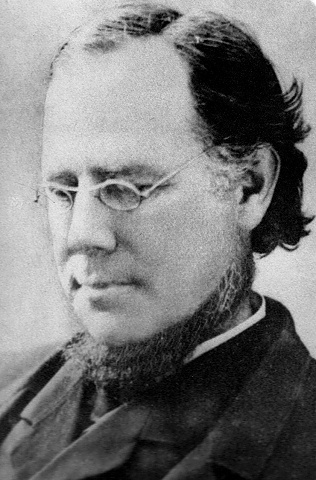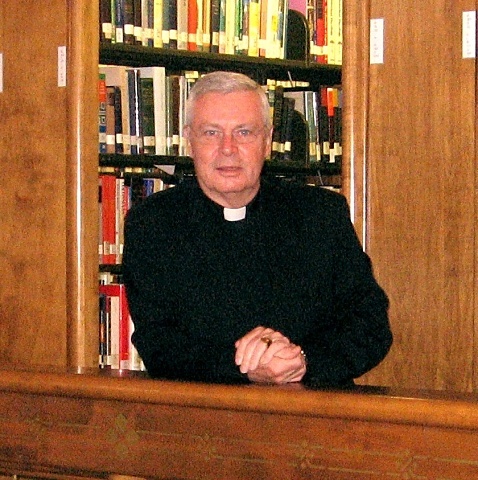November 26, 2012
This is the thirty-second in a series of previously unpublished reflections from the 1854 spiritual notebook of Paulist Founder, Servant of God Father Isaac T. Hecker. The reflection series is being made pubic in conjunction with Father Hecker’s cause for canonization. Father Paul Robichaud, CSP, Paulist historian and postulator for Father Hecker’s cause for sainthood, offers a response to Father Hecker’s reflection.

At the heart of recollection is the beginning of grace, for here we discern the truth of our passions, their motive and spirit, their progress and being. It is here that we learn the science of the saints and that sublime intelligence of how God operates within nature because people who recollect constantly contemplate where God and nature work together. Happiness begins with familiarity with God and leads to union with God.
Three things are necessary to exterior recollection which consists in being free from all that does not regard the soul. First, to limit ones attention to one’s work or occupation. Second, to shut one’s ears to what passes in this world and the news of the day, in order to have the imagination undisturbed. Third, to remove what is superfluous in order to occupy oneself with what is necessary to salvation and the perfection of the soul.
Interior recollection consists in three things. First, to shut the senses to all human things in order not to receive their images and the mind not be diverted by useless things. Second, to constantly seek to contemplate the presence of God that dwells at our center. Third, to constantly try to be occupied with holy thoughts in order to avoid idleness.

From St. Augustine in the 5th century to St. Teresa of Avila in the 16th century, Christian prayer was primarily understood as petition to God. In the age of the Catholic Reformation following the Council of Trent (1545-1564) a new understanding of mental prayer entered the Church’s practice and many of its advocates (Ss. Ignatius Loyola, Teresa of Avila, Alphonsus Liguori and Philip Neri) were spiritual mentors of Servant of God Isaac Hecker.
Traditionally mental prayer takes three forms: meditation, recollection and contemplation. Recollection is a form of mental prayer that sits between meditation and contemplation. It is similar to meditation in that we empty our minds and direct our focus. In meditation we focus on an image or a verse of Scripture; through a series of steps we evoke a vision of God. In recollection our focus is not an image of the holy but the active presence of God in our midst, beginning with and in ourselves. In meditation and recollection we work to open our very being to God, to put aside distractions and remain spiritually receptive to God’s action. In contemplation, the highest form of mental prayer God not ourselves acts and brings us into union. Here it is God not us, as only God can bring us into union with God. St. Teresa of Avila wrote that the highest form of prayer is seeing God face to face in heaven, the Beatific Vision, and below that is contemplation where God draws us into union, and below that is “acquired contemplation” where recollecting the presence of God (thus the term acquired), God acts and draws us into union (contemplation).
Father Hecker’s background was evangelical and he emphasized the presence of the Holy Spirit within the soul. At a time when devotion to the Holy Spirit among 19th century Catholics was all too similar to devotion to Saint Joseph or another patronal saint, Father Hecker taught that the Spirit was more than a patron who granted favors and protection but the presence of God in this age of the Church. That the Spirit was present within the individual and through the “science of the saints” – using the writing of the Catholic mystics he admired – one could encounter God. His three rules for exterior recollection stilled the body and his three rules for interior recollection focused the mind.
About Father Isaac Hecker’s 1854 Spiritual Notebook
Servant of God, Father Isaac Hecker wrote these spiritual notes as a young Redemptorist priest about 1854 and they have never been published. Hecker was 34 years old at the time, and had been ordained a priest for five years. He loved his work as a Catholic evangelist. The Redemptorist mission band had expanded out of the New York state area to the south and west, and the band’s national reputation grew. Hecker had begun to focus his attention on Protestants who came out to hear them. To this purpose Hecker began to write in 1854 his invitation to Protestant America to consider the Catholic Church, “Questions of the Soul” which would make him a national figure in the American church.
Hecker collected and organized these notes that include writings and stories from St. Alphonsus Liguori, the Jesuit spiritual writer Louis Lallemant and his disciple Jean Surin, the German mystic John Tauler, St. Thomas Aquinas and St. Jane de Chantal among others. These notes were a resource for retreat work and spiritual direction and show Hecker’s growing proficiency in traditional Catholic spirituality some ten years after his conversion to the Catholic faith. They are composed of short thematic reflections.